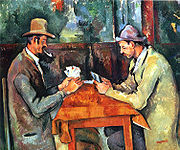|

Join our Newsletter
& get our free guide Starting Hands Revealed
We hate spam too!
We value your privacy and never share your email. All our emails have an opt-out link. Click it, and you will never hear from us again. 
|
Texas Hold'em Poker History
In recent years, Texas Hold'em Poker has exploded both on television and on the Internet. But how did it all start? How did the history of poker lead to this phenomenon? The origin of PokerThe exact origin of the game of poker is not known. It is believed that the earliest ancestor of poker is the game "As Nas" which was imported from Iran by the Crusaders. By the 15th century, a few card games were played in Europe which are likely nearer ancestors of poker. The French game Brelan and the British game Brag present similarities with poker, including bluffing. But the closest game both by its name & its rules appear in Germany in the 17th century under the name Pochen or Pochspiel. The English equivalent would be to poke, literally to knock, i.e. to brag as a bluff. All these European games influenced modern poker. But we need to wait until the early 19th Century in the United States to find the first historical accounts of poker as we know it today. The first such account is a description of a game played in 1829 in New Orleans. It was played with a deck of twenty cards and involved betting by four players to determine the strongest hand. Another historical account dates from 1843 and narrates how card games were played on the Mississippi steamboats. From Louisiana, poker spread all over the Far West and became an integral part of the Gold Rush, as it was the favorite pastime of the frontier pioneers. The game kept on evolving around the turn of the 19th century. The variations of Draw Poker and Stud Poker appeared a little later during the Civil War around 1860. These stable versions of poker were then re-exported over the entire world. The recent History of Texas Hold'em PokerThe concept of community cards inherent in texas holdem only appeared around 1925. The first game of hold'em is believed to have taken place in Robstown, Texas around that time. The game first spread throughout Texas and was only played there until it was introduced to Las Vegas in 1967 by Doyle Brunson, himself a Texan. In Nevada, Texas Hold'em rapidly supplanted Stud Poker as the most popular variation of poker. Stud poker in its two main forms five-card-stud and seven-card-stud was invented during the Civil War and became the dominant form of poker during the early twentieth century. In the iconic 1965 poker movie "The Cincinnati Kid", Steve McQueen plays around the clock five-card-stud poker against Edward G. Robinson. 33 years later, Matt Damon befittingly plays No-Limit Texas Hold'em in "Rounders". The creation in 1970 of the WSOP which uses Texas Hold'em Poker for its main event was a milestone in the history of Texas Hold'em. Because of a legal technicality, it took until 1987 for the game to finally overwhelm Draw Poker in California. Texas Hold'em as a variation of poker is believed to dominate other variants because it provides more strategic play and excitement. On one hand, there are four rounds of betting versus two in draw poker. On the other hand, the community cards open numerous drawing and bluffing opportunities which do not exist in stud poker. The invention which definitively revolutionized holdem poker to make it such a popular form of modern entertainment is the hole camera. Henry Orenstein's invention enabled the public to see tournament or high stakes players' hole cards and to share the thrill of the action in real-time, silently witnessing formidable bluffs and bad beats. The latest step in Texas Hold'em history is the so-called Moneymaker revolution. The public watched Chris Moneymaker win the 2003 WSOP main event just to find out that he had won his $10k seat by playing in a $39 satellite tournament. This was enough to ignite the current online Texas Hold'em Poker explosion which is far from exhausted. There are 7 official ways to shuffle a deck of 52 cards and these are seen as tricks that only experienced card players know and can perform. Casino experts casino.paddypower.com (hyperlink) have created a handy infographic with the types of shuffle, some you may not have even heard of. Try your hand a this ancient art form. 

|




 Texas Hold'em Poker is the most popular version of poker at the beginning of the third millennium.
Hold'em is the current incarnation of poker, which has kept on
changing over the years, as other variations were more popular in the past. Draw poker used to be the
favorite form of poker and Omaha is the candidate to replace holdem in the future.
Texas Hold'em Poker is the most popular version of poker at the beginning of the third millennium.
Hold'em is the current incarnation of poker, which has kept on
changing over the years, as other variations were more popular in the past. Draw poker used to be the
favorite form of poker and Omaha is the candidate to replace holdem in the future.





